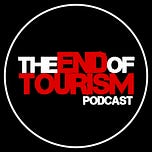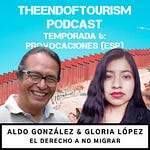Show Notes
John Urry’s The Tourist Gaze
Photography
The Senses
Surveillance and Artificial Intelligence (AI)
Spectacle
Homework
Transcript
Welcome friends to Season Zero of the End of Tourism podcast. In these mini-episodes, you'll hear short transmissions speaking to the principles of the pod. We'll introduce you, our listeners, to the themes and questions that will be woven into our conversations, a kind of primer on our politics. This episode is entitled "Spectacle, the Senses and Surveillance."
[00:00:31] So we can't talk about tourism without talking about the senses without talking about spectacle and without talking about surveillance. How do people come to perceive new worlds, sensually? How do we smell, taste, touch, hear, and see in foreign lands? And how did tourism become such a spectacle, driven incessantly by cameras, vision, and consumption? How is it that our movements feed surveillance states and surveillance societies?
[00:01:09] The English sociologist, John Urry coined the phrase, "the tourist gaze." His work dove into the worlds and ways in which tourists see in foreign lands, the way they look, observe, and watch local people, the way they watch local places themselves, and even each other.
[00:01:32]Modern people move with their eyes. We have become intensely visual beings. Some would even say that we are hypnotized by the eyes. On average, the other senses amount for a combined 15% of our perception. But not every culture carries this sensorial imbalance like we do. In other words, this way of perceiving the world is not natural, but cultural.
[00:02:03]This is not only what tourists bring to other worlds, but how they arrive in them, how they understand or more often misunderstand other cultures, people and places, through this hypnosis. Western worldviews reflect the images that Western people have their travels. None of this is new. Since the Renaissance, travel writing, manufactured the image of the world for those back home. Before photography, travel writing was the only way to explain to the masses how far off lands appeared.
[00:02:43] Each traveling author, each trip reflected the histories and power dynamics and prejudices of the time. Today, the same thing happens with photography and with social media. On the podcast, we will look deeply into the stereoscope of media, both past and present to understand these unseen consequences.
[00:03:08] Today, it seems that Urry's "tourist gaze" is intimately hitched to the camera and to photography. Photography has been a part of travel and tourism since the first cameras in the mid-19th century. Today, however, with the inundation of smartphones and wifi worldwide, the amount of photos taken is astronomical. The total number of photos ever taken has doubled in the span of just a few years.
[00:03:36] Of course, this has its consequence in the world and especially in the places, tourists, visit. The smartphone with the capacity to connect to the internet almost anywhere is the most dangerous and effective Trojan horse of globalization. If there was ever a way to attack or subvert traditional culture and culture itself, the smartphone, the handset of modernity, is it. It bypasses barriers that might otherwise shield people from the consequences of foreign entitlement. As soon as it has a foothold, it converts local people faster than any missionary would.
[00:04:19]The relationships that exist in could exist between our human sensing and the natural or more-than-human world is a kind of birthright. We might even call it a birth-responsibility, but today they are often ignored and neglected in favor of technology. The senses themselves are dulled to the point where we require more technology simply in order to get by in our day-to-day lives.
[00:04:47] As the senses whither, so does the wonder and wisdom and the kinship with the local world that our ancestors apprenticed and entrusted to us. In turn, our senses are outsourced to higher resolutions and more megapixels. They are outsourced to the cloud. We must ask, then, what are the consequences for having neglected those relationships, for having forgotten that wisdom? What happens to the more-than-human worlds in our midst as a result?
[00:05:23] What do they imagine us to be doing as we abandon them and the ancestors among us who might've honored, such senses, such sensing, deepening our ancient inheritance.
[00:05:35]You see, this is what tourism does. Sometimes, people travel only to take photos that have already been taken millions of times. Tourists desire to carve out the meaningless notches on their belt, drawing more and more attention to the slow destruction of the very thing they photograph, now reduced to nothing more than a photo or a photo op.
[00:06:03]Each photo, each location, each reaction, like, in commentary is recorded and funneled into an artificial intelligence underground, where it is converted into ways of both reducing and controlling our attention. This is what sends thousands, if not millions of people to foreign destinations as hunters of experience and pseudo-status.
[00:06:30]The attention economy feeds tourism and tourism undoes everything that makes a place itself. Overtouristed cities are already implementing Machiavellian panopticons, the all seeing eyes of local governments. They are using over tourism itself as a pretext to install surveillance programs that track every movement in and out of these places. Entire cities and entire populations. This is already well underway in places like Venice, Italy.
[00:07:07] Likewise, governments and industry are already launching digital travel passports that will not only contain all government-related documents, but act as "surveillance by design" tracking devices. The data can then be evaluated in order to privilege certain travelers over others, not unlike what is being done in China right now with the social credit and rating system there. In every way, shape, and form tourism feeds the dream-slash-nightmare of a totalitarian world.
[00:07:43] It seems to me that in the west almost no one is not a tourist. Let me say that again. It seems to me that in the west, almost everyone is a tourist. Almost everyone is a tourist, which is to say that we have become amateurs and strangers in our own neighborhoods, in part, because the spectacle of modern life and its media has ennobled a way of being in the world and in the neighborhood that is both temporary and seemingly inconsequential.
[00:08:17] The way we see in foreign lands comes from the way we see at home. We don't arrive in destinations as tourists. We leave home as tourists. This comes from home being understood and known, in our time, as an option, as a feeling, and even as a photo op. When home is no longer a place, when home becomes a choice or a potential "base," the responsibility of place is left in the hands of governments, usually to be sold off to the highest bidder.
[00:08:58] Home is hit with a wave of consequences, not unlike the places tourists go to visit and often for the same reasons. For our listeners, this might sound dreary, lamentable, and even over the top, but consider that if this arises for you in these ways, it might do so as a result of these things arriving mostly unconsidered.
[00:09:25] These are dangerous times and to be properly in them to find ourselves as faithful witnesses to the times, will likely ask more than we're willing and to give. That's okay too, and probably expected.
[00:09:40] This is both strange and mandatory because the times we're living in have been abandoned by a touristic mindset. For many, the old, week-long vacation has now become a lifelong lifestyle choice. Wanderlust, in other words. Not just escape, but socially legislated abandonment.
[00:10:03]Spectacle that conceals the wilting of the senses. Spectacle that conceals the rise of surveillance societies. Spectacle, that we will approach these conversations in a way that, all willing, subverts spectacle. Finding worthy resistance strategies, staying home and standing in solidarity with touristed places and peoples so that we may find a worthy way to bury spectacle. Welcome to the end of tourism.

















Share this post